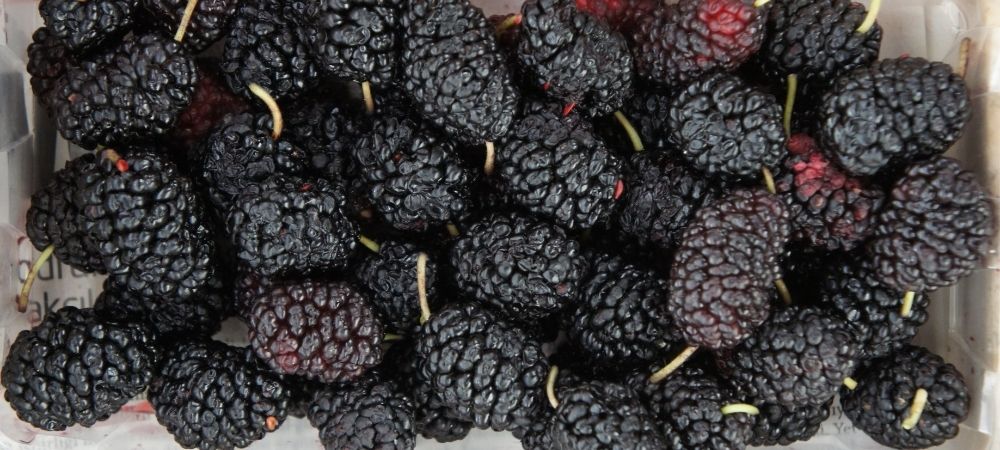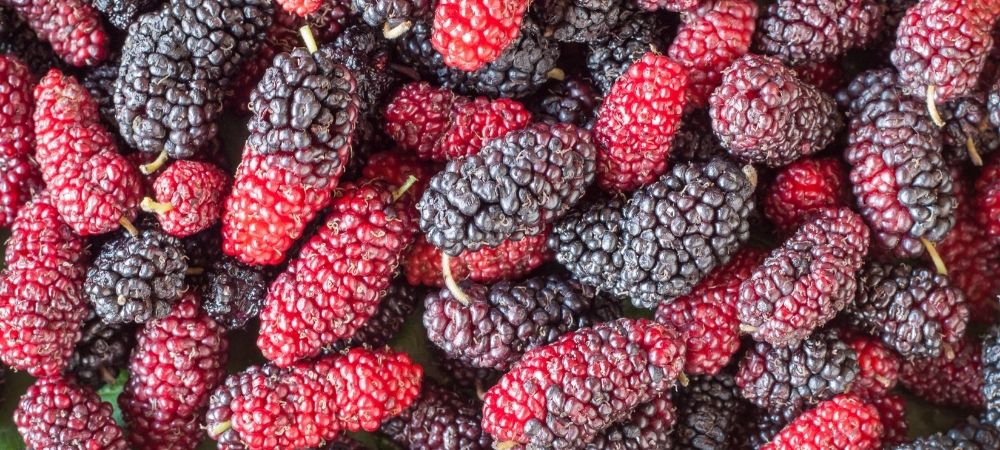
Mulberries seem relatively uneventful to many of us — you might not even notice them as you walk by.
But your dog will. Odds are your furry companion will want to eat them. Plenty of them.
Are mulberries safe for dogs?
As it turns out, these little nutritional powerhouses are fantastic and safe if you feed your dog mulberries properly.
What does that mean precisely? Read on to find out the surprising facts about mulberries.
Can Dogs Eat Mulberries?
Yes, dogs can safely eat mulberries in moderation and if they are ripe.
It is important to note that any mulberries that have been on the ground for too long should be avoided because they could be moldy or rotten.
Sometimes, too many mulberries can cause diarrhea, so it’s best to give your dog small amounts first and see how their stomach takes it. This also prevents them from ingesting too much sugar.
Mulberries are high in iron, potassium, vitamin K1, vitamin C, and vitamin E. This is great news for dogs.

Are Mulberries Safe for Dogs?
Yes, mulberries are safe and can be great for dogs.
Mulberries are high in vitamins C and K, which are essential for keeping your dog healthy. There are many other health benefits associated with mulberries:
High in Antioxidants
Mulberries contain antioxidants and resveratrol, which have been shown to promote good cardiovascular health and endurance in dogs. They also give mulberry its color.
Very Digestible and Nutritious
Mulberries are high in soluble and insoluble fibers. Fruit fibers help with digestion and prevent constipation. The insoluble fiber also helps speed up the passage of food through the digestive system, which provides relief from many digestive issues.
Better Blood Circulation
The iron in mulberries helps with the production of red blood cells. This helps boost the number of red blood cells your dog has, which can improve blood circulation and oxygenation throughout the body. They also prevent blood clots and improve cardiovascular health.
Healthy Bones
Eating mulberries has been shown to lead to healthier bones. The vitamin K, calcium, magnesium, and phosphorus found in mulberries are essential for healthy bones. These minerals speed up the recovery process of broken bones and contribute to a healthy skeletal structure.
Brain Protection
Mulberries protect brain cells from free radicals that can lead to brain degeneration. The antioxidants found in mulberries may help reduce the number of free radicals in the brain. This, in turn, protects the body’s neurons and synapses, so they don’t suffer any damage.
Prevention of Tumor Formation in GI Tract
It is uncommon for dogs to have tumors form in the GI tract, so it is hard to say if mulberries can help with preventing this from happening. They may provide some benefits and protect against cancerous cells. Anthocyanins, found in mulberries, have been shown to inhibit tumor formation.
Are Mulberries Poisonous for Dogs?
Mulberries are not poisonous for dogs, but should not be taken in excess.
That being said, there are two potential downsides you should look out for.
Upset Stomach
Mulberries are very high in both soluble and insoluble fiber, which is mostly great.
However, if your dog eats mulberries in large amounts, they could suffer from upset stomach, diarrhea, and vomiting.
Coat Staining
Mulberries can visibly stain a dog’s muzzle, fur, and paws. It is always best to keep your dogs out of mulberry bushes.
If your dog’s coat is stained, don’t panic. This will only require a thorough bath. While it is a bit inconvenient, it is not harmful to dogs.
Are Mulberries Hallucinogenic?
Unripe berries are hallucinogenic. This is why it is vital to make sure you feed ripe mulberries to your dog.
As they ripen, the hallucinogenic chemicals break down into different components, making them no longer hallucinogenic. Ripe mulberries do not contain any chemicals that cause hallucinations.
Unripe form also causes digestive issues in dogs.

Can Dogs Eat White Mulberries?
Yes, dogs can eat white mulberries. Just make sure that the mulberries in question are ripe and don’t feed your dog mulberries in large quantities.
The white mulberry tree is native to Eastern Asia. White mulberries are the main food of silkworms, and they can also be found in North America.
Can Dogs Eat Black Mulberries?
Yes, dogs can eat black mulberries. Make sure that you feed your dog ripe berries in moderate amounts.
Black mulberries are commonly used for medicinal purposes, too.
Can Dogs Eat Red Mulberries?
These mulberries can be found along the east and south coast of the USA.
Ripe red mulberries are safe for dogs to eat in moderation.
Unripe red mulberry contain a chemical that causes hallucinations.
Can Dogs Eat Unripe Mulberries?
No, dogs shouldn’t eat unripe mulberries. Unripe mulberry contains a chemical that causes hallucinations in dogs and humans alike.
Suppose you try to feed your dog an unripe mulberry. In that case, they will likely vomit or, at the very least, experience some diarrhea.
Additionally, unripe mulberries can cause nausea and other digestive problems in dogs.
Can Dogs Eat Dried Mulberries?
Dried mulberries are technically safe for dogs to eat, but they are not ideal for feeding them.
Dried mulberries are very high in calories and sugar, like most dried fruits.
Dogs do not need extra sugar in their diets. You don’t want to feed them food that contains a large amount of sugars and carbohydrates. This could lead to weight gain, obesity and other health problems.
Cat Dogs Eat Cooked Mulberries?
Dogs can eat cooked mulberries, but it is not recommended.
Cooked mulberries are usually mixed with other ingredients. These include sugar, flour, and other unsafe ingredients.
Dogs don’t need these extra ingredients in their diets. It’s always best to feed them fresh mulberries with the most basic of natural ingredients and avoid all of the potential health problems.
Can Dogs Eat Mulberry Leaves?
Dogs can eat mulberry leaves in moderation. They might even seek them out.
Too many mulberry leaves, however, lead to diarrhea and an upset stomach.
They are also used for medicinal purposes, such as throat infections, skin irritation, and inflamed joints.
Are Mulberry Leaves Toxic to Dogs?
Mulberry leaves are not toxic to dogs, but too many of them can lead to diarrhea and upset stomach.
ASPCA has put mulberry leaves on the list of non-toxic dog foods.
How to Serve Mulberries to Your Dog?
Dogs can eat fresh mulberries, but you will need to feed them a very small amount at a time. Depending on the taste of the fruit, your dog may like it or not.
If you plan on baking mulberries, you could serve too many at once. When dogs eat mulberry in baked treats, they could experience stomach upset and digestive health issues.
Instead, give a few fresh mulberries from the palm of your hand. How many mulberries can dogs eat exactly? Depends on the dog’s size.
Start with a couple, and only give once every couple of days.
You can gradually increase the amount but be careful not to give too much at once, or diarrhea is likely to occur.
If your dog experiences diarrhea or an upset stomach after consuming mulberries, reduce the amount you give your pooch.

How to Prevent Your Dog From Overeating Mulberries?
Can dogs eat mulberries in large amounts? No, this is one thing you need to look out for.
If you’ve come across a mulberry tree, keep your dog on a leash as you walk through the area. This will prevent the dog from running away and eating up too many mulberries at once especially if they tried them before and liked them.
Also, teach your dog the command to leave food. This prevents them from picking up any food that they find on the ground.
If your dog doesn’t listen to the command, you will need a leash to prevent them from picking up and eating mulberries.
Finally, if you have mulberry trees in your backyard, make sure it’s in an area that your dog cannot access. Also, regularly pick up the mulberries that fell to the ground. If you don’t, your dog’s sniffing around a mulberry tree will likely end in eating too many unripe mulberries.
Can Puppies Eat Mulberries?
Yes, puppies can eat mulberries.
Puppies should be fed a moderate amount of mulberries to avoid diarrhea.
Only give one or two at first since the pup’s stomach is more sensitive than adult dogs’.
If your puppy gets sick after eating mulberries, reduce the amount you feed until the pooch’s tummy can handle more.
Toxic Berries to Avoid
It is crucial, when it comes to common berries, to know which ones are toxic to dogs. Avoid them at all costs because the toxic berries can lead to diarrhea, heart problems, and even death. The berries that you should avoid feeding your dog if possible include:
- Juniper berries
- Pokeberries
- Baneberries
- Holly berries
- Cherries
- Mistletoe berries
- Gooseberries
- Salmonberries
- Dogwood berries
If your dogs eat any of these, watch out for the symptoms of berry poisoning.
Symptoms of Berry Poisoning in Dogs
If your dog eats any berries from the list above, watch for these symptoms:
- Loss of appetite
- Diarrhea
- Vomiting
- Drooling
- Abdominal pain
- Difficult breathing
- Low blood pressure
- Decreased heart rate
These symptoms could be a sign of berry poisoning and should be treated quickly. If you notice these symptoms, especially the latter ones, call the vet immediately.
Berry Nice Dog Food
Mulberries pack tons of nutritional benefits for your furry friend. Dogs love them, and mulberries love them back for the most part.
Make sure your dog doesn’t overeat mulberries and feed your dog only ripe ones. Unripe can be hallucinogenic and cause digestive issues.
Overall, mulberries are some of the healthiest “unorthodox” dog food out there. You simply need to follow a few dietary rules.
Wanna learn more about surprising and delicious foods you can share with your dog? Check out this comprehensive list of dog-approved treats.

